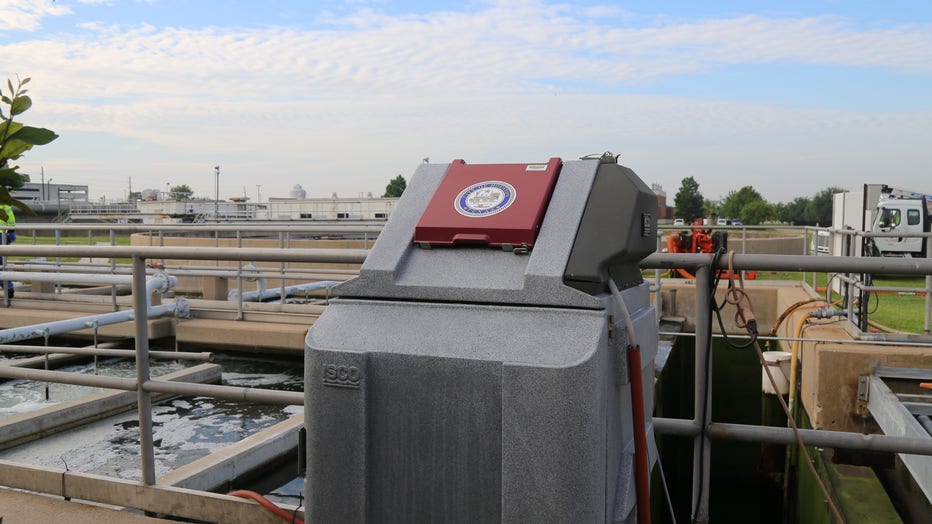Houston project monitors wastewater to identify emerging COVID-19 outbreaks

Houston project monitors wastewater to identify emerging COVID-19 outbreaks
Houston Mayor Sylvester Turner and Houston Health Department officials discuss a wastewater monitoring project that collects data with the goal of identifying and stopping emerging COVID-19 outbreaks.
HOUSTON - A wastewater monitoring project is underway in Houston with the goal of pinpointing and stopping emerging COVID-19 outbreaks.
The project is a collaboration between the Houston Health Department and leading wastewater and data scientists from Rice University and Baylor College of Medicine.
The project tests wastewater from the city’s 39 treatment plants for the presence of SARS-CoV-2, the virus that causes COVID-19. Officials say people who have COVID-19 shed the virus in their feces, even if they don’t have symptoms.
“The City of Houston has worked hard to educate and empower the public about COVID-19 and stop the virus from spreading in our community. This innovative project equips the Houston Health Department with localized data that indicates where a COVID-19 outbreak may be occurring before it shows up in viral test results,” said Houston Mayor Sylvester Turner. “Ultimately, the goal is an early warning system that allows the health department to identify problem areas sooner and put measures in place to slow the spread.”
RELATED: With strict guidelines, visitors now allowed at nursing homes in Texas
The health department says testing, outreach and education can be increased in areas with higher virus concentrations in the wastewater.
“At a time when fewer people are getting tested, this project helps us see what’s happening in the city,” said Dr. David Persse, local health authority for the Houston Health Department. “People still need to go out and get tested, but this project gives us data that serves as another tool to identify disease, slow the spread, and save lives.”

The project, a partnership with leading wastewater and data scientists from Rice University and Baylor College of Medicine, tests wastewater from the city’s 39 treatment plants for the presence of SARS-CoV-2. (Photo courtesy City of Houston)
Officials say wastewater data can also help detect disease resurgence in communities, is more cost effective than mass testing surveys, and provides data in areas with limited COVID-19 testing.
“Testing wastewater is a faster and cheaper way to monitor community health compared to testing individuals,” said Dr. Lauren Stadler, assistant professor of civil and environmental engineering at Rice University and academic lead of the project. “This approach is a powerful tool that doesn’t require any individuals to opt-in and provides a way to measure both asymptomatic and symptomatic cases. Viral load in wastewater is an early indicator of one to two weeks in what we will see in the community's clinical positivity rate."
LIVE: Interactive Coronavirus case data and map
The wastewater testing began in May, resulting in additional COVID-19 testing at congregant living centers in Houston. The health department says they will soon begin testing wastewater at Houston long-term care facilities.
“Tracking the virus in wastewater provides an unbiased estimate of the extent of the virus compared with relying solely on clinical testing,” said Dr. Loren Hopkins, chief environmental science officer for the Houston Health Department and professor in the practice of statistics at Rice University. “The hope is to continue using this method to help inform public health decisions regarding interventions to control the virus.”
Officials say trends from the project indicate a decrease in the virus across the city, mirroring the dropping positivity rate and further validating the project as a potentially faster method to identify and contain the disease.
Dr. Anthony Maresso, associate professor at Baylor and founder of BCM TAILOR Labs, says wastewater has been studied before during epidemics.
“Researchers in the City of Houston pioneered these approaches of looking at wastewater during the terrible polio epidemics that plagued Houstonians in the 1940s – 1960s, thus helping create the field of environmental virology. That great legacy continues with this project,” Dr. Maresso said.
Health officials say the project is not a substitute for COVID-19 testing. Several free COVID-19 testing sites are open in the city. Some require appointments. Click here to learn more.

